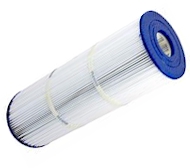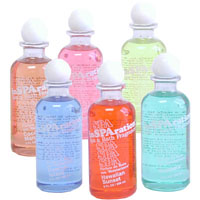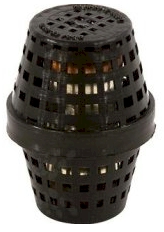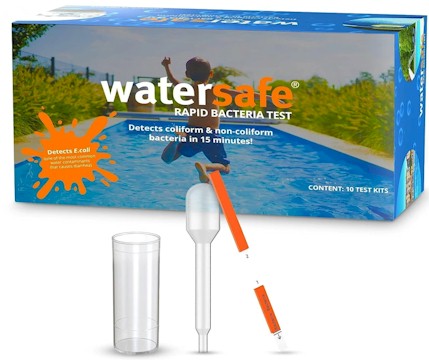|
|
269-978-1983
|
| |
|
|
|
|
|
|
|
|
|
|
|
|
|
|
Popular Products:
|
|
|
|
|
|
|
|
|
|
|
| |
|
Swimming Pool and Hot Tub Water:Problems with Copper, Iron, and Manganese Metals
Metals - such as copper, iron, and manganese - can discolor the pool water, or can even stain your spa or pool surfaces, if the problem gets ignored. When metals decide to "hang out" in excess, they will color your water. When allowed to "hang out" for too long, they'll actually deposit themselves on the interior surfaces of your pool or spa in the form of a stain.
Metals are oxidized by chlorine, so if you notice that your water is crystal-clear, but becomes tinted (but not murky) right at the time chlorine is added to the water, then it's safe to say that you most likely have a metal problem. The three main metals you will have to worry about are copper, iron, and manganese (less common than iron or copper). Below we will illustrate a table with the symptoms and causes of each, followed with appropriate treatments to fix the problem:
| Metal |
Color of water or stains |
Causes |
| Copper |
green, gray, or turquoise |
Well water, corrosion of metal equipment in pool or spa, copper-based algaecides |
| Iron |
rusty or green |
Well water, corrosion of metal equipment in pool or spa |
| Manganese |
purple, black, or coffe-brown |
Well water |
More detailed information on the symptoms and causes of metals in your water:
Generall symptoms for all metals that can be in your water are:
- colored water that is still clear
- stained surfaces
- possible stained nails or hair
All three metals can find their way into your pool or hot tub from well water. Although less likely, it is also possible for main water to pick up some traces of metals from the plumbing network before entering your pool or hot tub. The legal limit for manganese in main water is so low, however, that manganese will most likely not be a cause of any problems if main water is used.
Copper and iron can also be due to the corrosion of the pool's or hot tub's metal components (moreso the case with older models - now pool and hot tub water has very little contact with metal parts). If the sanitizer is too high, or if the pH is too low, the water going through your pipes will be harsher, which leads to more probable corrosion. Balanced water aside... after years of wear-and-tear in even the most well-kempt pool or spa, the pipes will eventually erode, due to the continuing force of water rushing through, which can also lead to metal ions entering your water.
Copper-based algaecides may also be to blame for high concentrations of copper. Some algaecides (generally the cheaper ones) will supply the water with copper ions, and if too much algaecide is used, the water will then turn green.
Preventing Metal Problems
Balancing your water - meaning that your pH, total alkalinity and calcium hardness are at the appropriate levels - is necessary to prevent stains and colored water.
You can use Sea Klear Metal Control to keep suspended metals from staining your hot tub or pool surfaces. Sea Klear Metal Control is a sequestering agent, meaning it ties up minerals in the water and prevents them from being oxidized by the chlorine, which would otherwise color your water or stain your surfaces.
Treating Metal Problems
- Shock treat the water.
- Vacuum away the waste that settles on the bottom of the pool or hot tub.
- Partially drain and refill the water. If your Total Dissolved Solids count is too high, your water will not be able to hold any more dissolved material, which means it will have to suspend some of it (much like how water can only accomodate so much salt before you see the excess salt floating around in the cup).
- Use Sea Klear Metal Control to keep suspended metals from staining your hot tub or pool surfaces in the future.
|
|










